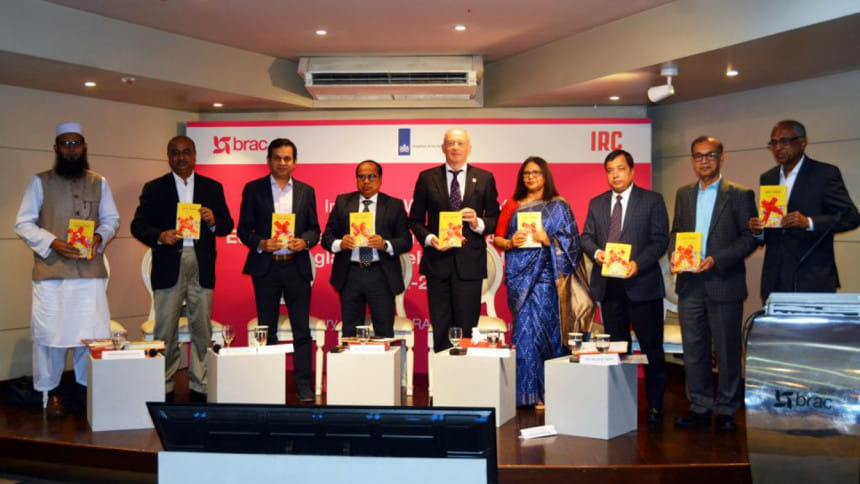1 million people from climate hotspots to get safe water and sanitation services

One million marginalised people will get safe water and sanitation services at 45 upazilas of 14 districts from 4 climate hotspots through a new project implemented by world's largest development organisation BRAC.
A project titled "Equitable and Sustainable WASH Services in Bangladesh Delta Plan Hotspots 2022 - 2026" starts its journey with this target through an inception workshop on 25 January 2023 at BRAC Centre, Dhaka.
The Embassy of the Kingdom of the Netherlands provides financial support to the project, while IRC Netherlands joins BRAC as the implementing partner.
BRAC also launched a book at the inaugural session of the workshop, titled Nirapod Pani, Poyonishkashon O Porichhonnotay BRAC-er Obhijatra: Ekti Somaj Rupantorer Golpo (BRAC's Journey Towards Safe Water, Sanitation and Hygiene: Transformation of a Society) published by the University Press Limited (UPL) and authored by Dr Md. Akramul Islam and Milon Kanti Barua.
Co-author of the book and BRAC's senior director of water, sanitation and hygiene (WASH) Dr. Md Akramul Islam said in his welcome speech, in this book, we have tried to capture lessons not only from our own interventions but those from the government and different sectors in last 40 years. We have closely worked with DPHE (Department of Public Health and Engineering), particularly in the hard-to-reach areas. BRAC's WASH programme focuses on four areas: The southern region of Bangladesh particularly coastal region, Barind Tract, Flash flood and Haor areas.
Speaking as the Chief Guest, Md. Khairul Islam, Local Government Division's additional secretary for the water supply wing said, in 2003, only 33% of households had hygienic latrines and 25% had unhygienic latrines. Open defecation was very common. Now in 2023, almost every family has access to latrines. The present status and sanitation of Bangladesh in coping with the challenges of climate change and global warming and in protecting the environment have been highly acclaimed by development partners.
His Excellency Anne Van Leeuwen, ambassador of the Embassy of the Netherlands, speaking as the guest of honour, said, the governments of the Kingdom of the Netherlands and Bangladesh began a partnership with WASH in 2005. Our partnership with BRAC began just next year in 2006. Some aspects of the Bangladesh Delta Plan are huge and expensive. But there are WASH solutions also that are not expensive, and they are innovative too, in terms of ensuring equitability and sustainability.
Asif Saleh, executive director of BRAC, attending the inaugural session as the chair, said, we have progressed a lot but there are still 20 million ultra-poor in this country. The conversation has started everywhere that water is going to be the next scarcity. There is going to be a severe water crisis if we don't act now, and if we don't have serious planning in place.
BRAC WASH programme implemented a number of projects with innovative approaches and strategies to achieve goals of safe water and sanitation from MDGs to SDGs. In line with that, this new project is striving to improve the gap between access to and quality of services, especially for the marginalised communities in hard-to-reach areas.
Since 2006, various project interventions by the BRAC WASH programme have helped 44.20 million people gain access to hygienic sanitation and around 3 million individuals gain access to clean drinking water. This time, the project plans to serve 1 million community members and students through safe water and sanitation services in 4 climate hotspots – coastal, barind, haor and floodplain areas.
Sheikh Md. Moniruzzaman, director general (Additional Secretary) of NGO Affairs Bureau; AHM Khalequr Rahman, executive engineer of research and development division, DPHE; Md. Khairul Islam, WaterAid South Asia's regional director; World Bank WASH specialist Rokeya Ahmed were present as special guests and panelists.

 For all latest news, follow The Daily Star's Google News channel.
For all latest news, follow The Daily Star's Google News channel. 



Comments